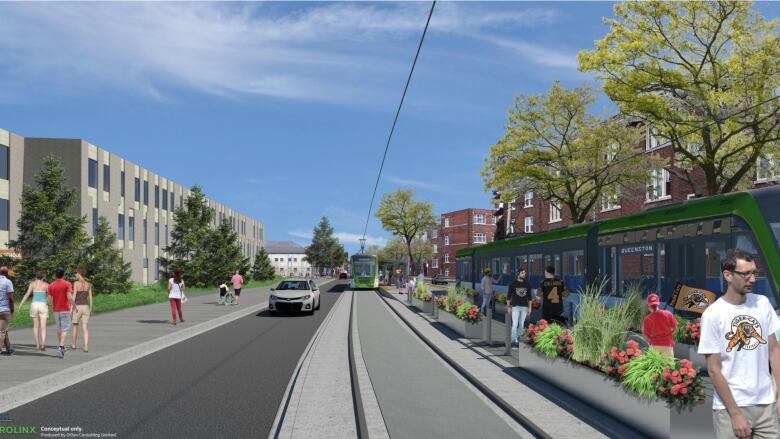Metrolinx will own properties for LRT by the time next council 'off-ramp' arrives

Metrolinx will likely already own land on Hamilton's main downtown corridor by the time city council make the final decision on whether it wants light rail transit (LRT).
With this project, or any other project, that could happen.- Andrew Hope, Metrolinx
The agency has put deposits on some of the more than 250 properties it will have to buy along Main and King to make LRT a reality. It expects to close land deals "in the coming weeks or months."
That means by the time city council decides whether to sign a master agreement in late 2017 — a legally binding document that represents council's last true off ramp — Metrolinx will likely already have bought land for it.
LRT supporters celebrated Wednesday, when councillors voted to approve an environmental assessment (EA), a decision seen as a turning point in the project. But some councillors said they reserved the right to vote against the project later.
If LRT is cancelled, Metrolinx could end up owning land with no LRT, said Andrew Hope, Metrolinx's director of the Hamilton LRT project.
"At the end of the day, if that were to happen, we'd own an asset," he said. "With this project, or any other project, that could happen."
"That's part of the balancing act here."

Most of the properties are only partial lots, or storefront "shaves" required to accommodate LRT. Roughly 90 will have to be fully or partially demolished.
At some point in time, we have to recognize it's going forward.- Coun. Chad Collins
Most of the properties, Metrolinx says, are around stop locations, where the agency needs to widen the right-of-way to accommodate stop platforms and traffic lanes.
Property acquisition has to go ahead, Hope said. The direction to Metrolinx and the city is to move ahead "until told otherwise. That includes getting started on property acquisitions."
In the fall, city council will vote whether to sign a master agreement. Legally, it will represent a point of no return for council on the $1 billion project, which the province is paying to build.
It's happened before
The LRT plan will run from McMaster University to Eastgate Square — the latter added to the plan again at the eleventh hour Wednesday to avoid the project's demise.
Wednesday is also when city council voted, in a tense and emotional debate, to approve the updated EA. Many supporters feared the project would die then.
But Chad Collins, Ward 5 councillor, says if Metrolinx is buying properties, it's already too late to back out. That's why, despite being an LRT opponent, he voted for the EA. It's better to unify council now, he said, and not give LRT opponents false hope.
If LRT fails, he said, it would be similar to what happened on Hamilton's beach strip in the early 1980s, where the conservation authority bought 174 properties for a park that didn't happen. As of last summer, the city still had 30 properties to sell.
"The neighbourhood changed its mind and we were left with a bunch of properties," he said.
'There's no turning back'
With LRT, "at some point in time, we have to recognize it's going forward. Once the EA passes and the properties are purchased, there's no turning back."
Metrolinx won't say exactly how much it's spent on land so far. It's spent or committed $43,000,760 on "staffing/consulting/land acquisition deposits," says a city report. Overall, $71,985,740 has been spent or committed on LRT to date.
Metrolinx staff will spend the next few weeks updating the EA to include Eastgate Square again, said Hope. The plan is to include Eastgate in the same time and budget as before.
"Our direction from the minister is pretty clear, which is to work with the city within the existing budget," he said.
This summer, Metrolinx will invite three potential companies, chosen through a pre-qualification process, to design, build and operate the system via a private-public partnership. Those bids will indicate what Metrolinx needs to trim from the project to accommodate Eastgate Square.